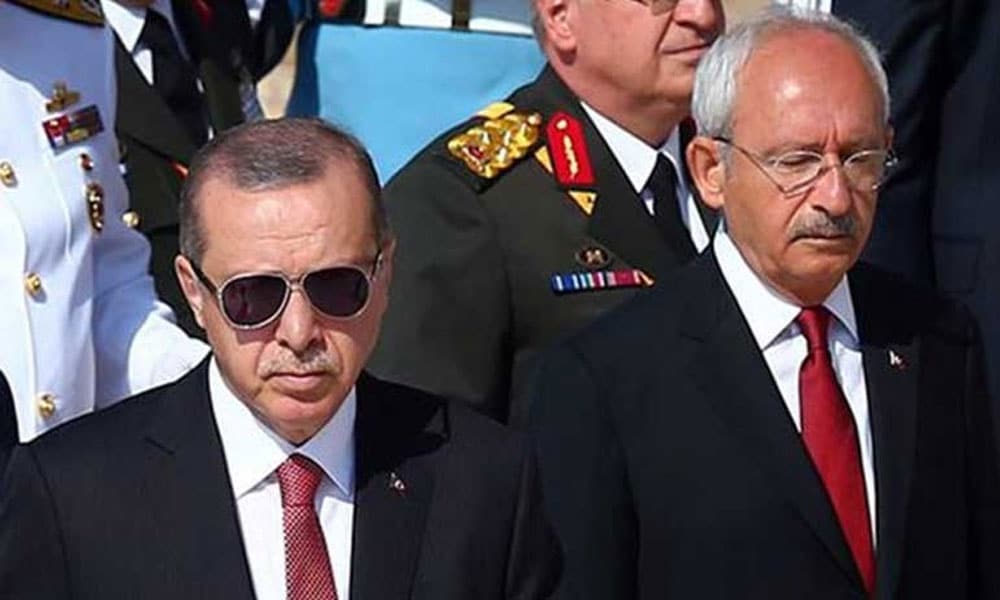

Turkish President Tayyip Erdoğan said on September 1 that his Justice and Development Party (AKP) government was planning to make public a new Constitution draft to the “nation’s discretion” in the first months of 2022. He wants to get the draft ready together with his election partner, Devlet Bahçeli, the leader of the Nationalist Movement Party (MHP) without the need to consult with the opposition; at least for the time being.
This was a few hours earlier his election partner, Nationalist Movement Party (MHP) leader Devlet Bahçeli said that the two agree to lower the election threshold from 10 percent to 7 percent. That was interpreted in political circles that neither Erdoğan nor Bahçeli was sure that the MHP could guarantee 10 percent support in the next elections. Because their “People Alliance” is losing ground in the surveys the threshold is likely to be lowered as well.
Is it true that there is no need for Erdoğan to go to the opposition parties if he really wants a new constitution?
First of all, an observation: The Presidential Government System Constitution, which was approved through the 2017 referendum with claims of excellence, has almost expired in less than five years. Even those who stood up for the constitution have been looking forward to another one for some time. It means that the perfection claim attained to it proved to be hollow.
Another observation: From the words of Bahçeli and Erdoğan, it is understood that a new election law draft will be submitted to the Parliament in the last months of 2021 and a new constitution draft will be submitted to the Parliament in the first months of 2022.
Some commentators have already begun to interpret this as the fact of putting the ballot box before the voters without going to an election in the first half of 2022. However, it is not that easy: there is a long way to go before things will get to that stage.
What does parliamentary arithmetic show?
First of all, we do not know yet whether the AKP and MHP have agreed on a specific draft. A few months ago, at the beginning of May, Bahçeli shared the draft of the MHP with the public, throwing Erdoğan a curveball. In that draft, reminiscent of a minefield, Bahçeli was making suggestions that limit Erdoğan’s powers. Those included proposals like there should be two Vice Presidents who would come to power through election, not by appointment of Erdoğan, so they could not be dismissed at Erdoğan’s will. Also proposals like cabinet members -if not the president- should be subject to Parliamentary questioning and vote of confidence; now it’s also at Erdoğan’s will. Erdoğan, on the other hand, said that AKP will forward its draft to MHP soon.
However, the process is not only about a deal between the two partners. There is an important hurdle like parliamentary arithmetic.
400 votes are required for a new Constitution, or amendments to the Constitution, to be approved by the 600-member Turkish Parliament, and at least 360 votes are needed to go to a referendum.
Whereas (as of today), the People’s Alliance has 336 seats, 288 for the AKP and 48 for the MHP. In other words, 24 more seats are needed, even to submit the draft to the public vote. Even if all right-wing parties, which have one or two deputies in the parliament, somehow vote for the AKP-MHP alliance, this gap cannot be closed.
In summary, parliamentary arithmetic does not allow Erdoğan to amend the constitution without going to the opposition if he really wants a change.
How will suggest to the opposition?
At that stage, Erdoğan could face two main problems.
At first, what will he suggest to the opposition? Nation Alliance formed by Republican People’s Party (CHP) leader Kemal Kılıçdaroğlu and Good Party (IYI) leader Meral Akşener want his “one-man-rule” to be over to adopt a Parliamentary system. ay to the opposition? What kind of articles Erdoğan can place in his new draft that could please the opposition bloc, and how will he guarantee that those articles will not be changed at the last minute during the General Assembly vote?
Secondly, how will he make Bahçeli accept promises to the opposition?
Let’s give an example… Let’s say that Akşener, suggests a new structure that includes Prime Ministry and a strengthened Parliament as a constitutional requirement. Even if Erdoğan accepts, will Bahçeli, who benefits from a politically symbiotic existence with the AKP be convinced? Or, if AKP attempts to reconcile with the Kurdish-problem-focused Peoples’ Democratic Party (HDP), the third-largest group in the Parliament with 56 seats, what will Bahçeli say, as he wants the Constitutional Court to shut down HDP? If he somehow agrees, what will he ask from Erdoğan in return?
For example, would Erdoğan make concessions that cabinet members, high judges, governors, and ambassadors will be subject to parliamentary investigation and approval to convince the opposition? Or will it restore the autonomy of the public broadcaster TRT and universities? Even if this happens, would the opposition bloc swallow such tactics? It looks difficult.
Is it that hard to talk to Kılıçldaroğlu?
It seems it’s even more difficult for Turkey to productively move forward for a long time with the current constitution.
Turkish politics cannot carry for too long the concentration of all power in the hands of one person. A new Constitution can be considered as truly new in the direction of pluralist democracy and the rule of law only to the extent that it strengthens the separation of powers, the judiciary, and the Parliament.
What Erdoğan should do is obvious for many years. If he can put aside his aim of having control on every state affair, the first thing he should do would be to talk to the main opposition leader, Kılıçdaroğlu. And let the Parliament do its job freely.
For example, if the covert dialogue with the imprisoned leader of the outlawed Kurdistan Workers’ Party (PKK) could also be coordinated with the Parliament and opposition leaders, as the CHP suggested at that time, the history could have flown differently, including the Syrian crisis.
It took five years to understand that the current Turkish constitution which was drafted, without resorting to the opposition, has not worked well.
Will Turkey make another Constitution every five years, depending on how the authorities find it useful at that moment?
Is it that hard for Erdoğan, who prides himself on talking to everyone, to talk to Kılıçdaroğlu for the better interests of Turkey, if he wants a better Constitution?
If they can’t agree, they can at least say “we tried, it didn’t work” in the face of history.


